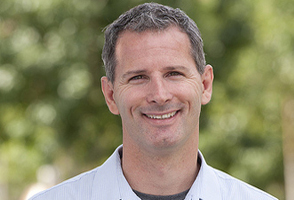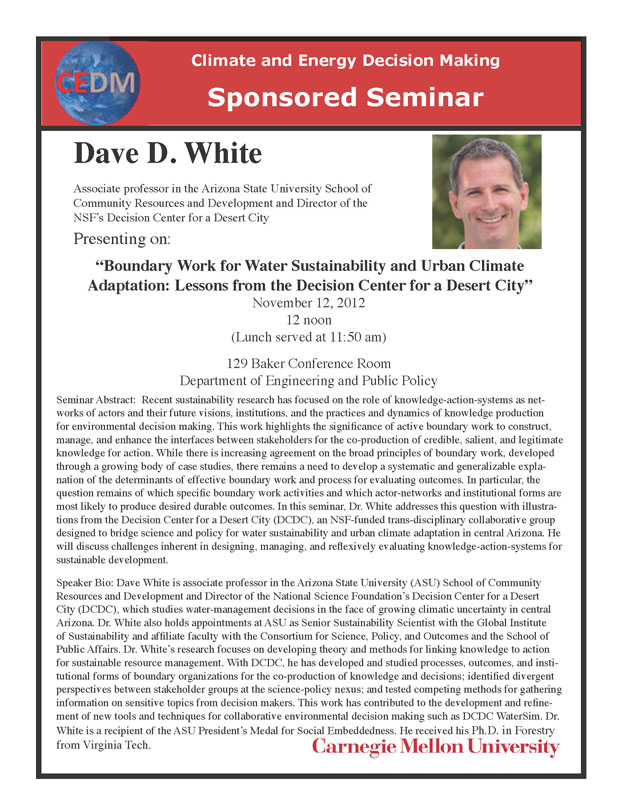November 2, 2012
 On November 12, 2012, DCDC co-director Dave White will be traveling to the Center for Climate and Energy Decision Making (CEDM) at Carnegie Mellon University to give a seminar on Boundary Work for Water Sustainability and Urban Climate Adaptation: Lessons from the Decision Center for a Desert City.
On November 12, 2012, DCDC co-director Dave White will be traveling to the Center for Climate and Energy Decision Making (CEDM) at Carnegie Mellon University to give a seminar on Boundary Work for Water Sustainability and Urban Climate Adaptation: Lessons from the Decision Center for a Desert City.
CEDM is one of four research centers including DCDC which receives funding from the National Science Foundation under the Decision Making Under Uncertainty program.
Under the direction of PI Morgan Granger, the Center for Climate and Energy Decision Making develops and promulgates new and innovative, behaviorally and technically informed insights involving the intersection points between climate and energy. It also generates methods to frame, analyze, and assist key stakeholders in addressing important decisions regarding climate change and the necessary transformation of the world's energy system.
NSF's Decision Making Under Uncertainty Collaborative Groups
In 2004, the National Science Foundation funded a group of Decision Making Under Uncertainty (DMUU) collaborative groups for five years. The goal of DMUU collaborative groups have been to support research, education, and outreach that increase basic understanding of decision-making processes and of the information needed by decision makers; to develop tools to support decision makers and increase their ability to make sound decisions; and to facilitate interaction among researchers and decision makers. In addition, NSF's Human and Social Dynamics priority area supported interdisciplinary groups that addressed questions related to change and dynamics in human systems more broadly.
In 2010, the DMUU collaborative groups competition drew upon both of these past experiences to address the need for larger-scale projects addressing decision making under uncertainty with respect to climate change and other long-term environmental change. With this funding, NSF seeks to stimulate societally beneficial research that will enhance basic theoretical understandings in the social and behavioral sciences as well as related fields of science and engineering.
In addition to ASU and Carnegie Mellon University, the following institutions were awarded NSF cooperative agreements for Decision Making Under Uncertainty:
- University of Chicago, PI Ian Foster, Climate Decision Making Center
- Columbia University, PI David Krantz, Center for Research on Environmental Decisions
Talk Abstract
Recent sustainability research has focused on the role of knowledge-action-systems as networks of actors and their future visions, institutions, and the practices and dynamics of knowledge production for environmental decision making. This work highlights the significance of active boundary work to construct, manage, and enhance the interfaces between stakeholders for the co-production of credible, salient, and legitimate knowledge for action. While there is increasing agreement on the broad principles of boundary work, developed through a growing body of case studies, there remains a need to develop a systematic and generalizable explanation of the determinants of effective boundary work and process for evaluating outcomes. In particular, the most likely to produce desired durable outcomes. In this seminar, Dr. White addresses this question with illustrations from the Decision Center for a Desert City (DCDC), an NSF-funded trans-disciplinary collaborative group designed to bridge science and policy for water sustainability and urban climate adaptation in central Arizona. He will discuss challenges inherent in designing, managing, and reflexively evaluating knowledge-action-systems for sustainable development.


